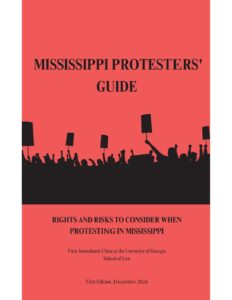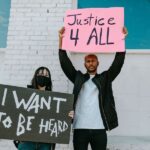
The Mississippi Protesters’ Guide provides individuals and groups who are considering organizing or engaging in protest activity with a reader-friendly, plain-language roadmap outlining some of their legal rights and risks.
It is organized by topic area based on different contexts and scenarios in which protest activity may occur. A checklist appears at the end of each topic area to help readers identify the key takeaways.
The information in this guide is not intended to be, and does not constitute, legal advice. Laws and how courts interpret them can change rapidly and vary by jurisdiction. Please consult with a lawyer regarding your individual situation.
Researched and written by Joseph Will and Ellie Wilson-Wade, with editing and research support from Urub Khawaja and Clare Norins.
View and Download

The Issue
Free Speech
The First Amendment protects the right of private individuals to engage in speech and expression without being censored or punished by the government because of their viewpoint. While the government may constitutionally regulate the time, place, and manner of private speech in public forums it must do so in a viewpoint-neutral manner and, depending on…
Explore Issue
The Issue
Right to Record
The First Amendment generally protects the right to gather information about what public officials do on public property, which includes the right to record matters of public interest. Although this right is clearly established, some government officials try to prevent or retaliate against those who record them. Read more about our advocacy for the right…
Explore Issue
The Issue
Speech-Based Retaliation
The First Amendment prohibits the government from retaliating against individuals exercising their rights to free speech, press, assembly, and petition of the government for redress of grievances. Read more about our work to address retaliation against individuals who have engaged in protected expression, newsgathering, and petitioning.
Explore Issue
The Issue
Student First Amendment Rights
The First Amendment protects students and student journalists from censorship and retaliation in public schools and universities. As the Supreme Court has explained, students do not “shed their constitutional right to freedom of speech at the schoolhouse gate.” Read more about our work on behalf of students and student journalists here.
Explore Issue